Charging an electric vehicle in public can range in price from free to very expensive. When we recently charged a new 2022 Chevrolet Bolt at an EVgo DC fast charger (DCFC) in Bedford, NH, we discover the pricey end of the spectrum can be more than it would cost to fuel a "gas-guzzling" V8-powered muscle car.
Related Stories:
Big Mistakes To Avoid When Charging an EV In Public
Many Public DC Fast Chargers For Electric Vehicles Are Slower Than You’d Think
Quick Stops At Level 2 Public Electric Vehicle Chargers Are Worthless
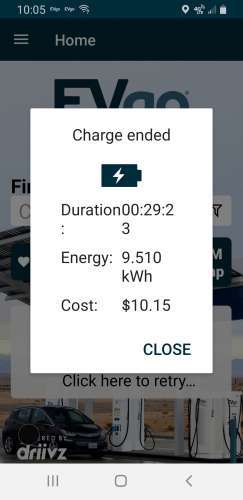
$10.15 To Add 34 Miles of EV Range
We charged up a Chevy Bolt using the EVgo DC fast charger, and the bill was $10.15. That amount of money added 34 miles of range to the Bolt. So, the cost per mile of energy was 30 cents per mile. Let’s compare that to a 2021 Dodge performance car we tested the prior week.
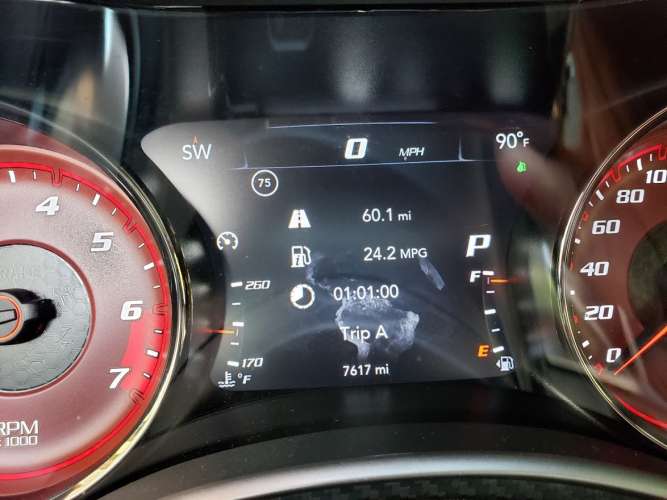
The Dodge had 797 hp, and it returned a combined fuel mileage of 24 MPG in our use on the same route we tested the Bolt. We paid $2.90 per gallon for the gasoline it uses. Doing some “goes in’tahs,” the cost per mile for energy in the muscle car turns out to be 12 cents. Thus, the cost per mile to energize the Bolt was roughly triple what the V8 gas-powered car cost us.
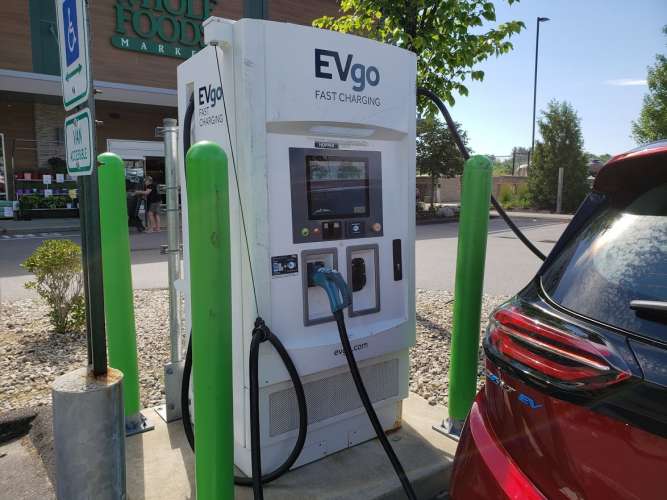
Charging Etiquette
When charging in public one is supposed to quit charging when one’s EV reaches 80% state of charge. The reasons for this are two-fold. First, the rate at which charge can be added to an EV battery is more rapid below 80% and much more time-consuming as the battery reaches full. Second, EV chargers are in very short supply. We need to ration them.
On my route from the metro Boston area to the lakes region of New Hampshire, there are exactly zero public DC fast chargers. In order to charge at a DCFC, I took a slightly longer by time route to swing by one of only two DCFC charging spots in that area. Google “Henniker NH DC Fast Chargers” if you want to see what I mean about no chargers. I needed to top-off in order to complete the 200+-mile route I was making. So, I broke charger etiquette, and I charged to full.
I also charged at the DCFC because I wanted to test my EVgo membership RFID card and account and see how long the DCFC took to add back miles. Both were successful tests.
Charging For Free
Coincidental to my test, GM was running a free-to-charge promotion day during the week I had the Bolt. I think free anything is great, but I always wonder, what’s the hidden agenda? If charging up an EV is very affordable anyway, why does there need to be a promotion to make it “free?” If Dodge offered free gas to muscle car owners, I suppose folks would jump at the chance for a free fillup. But why make EV charging free?
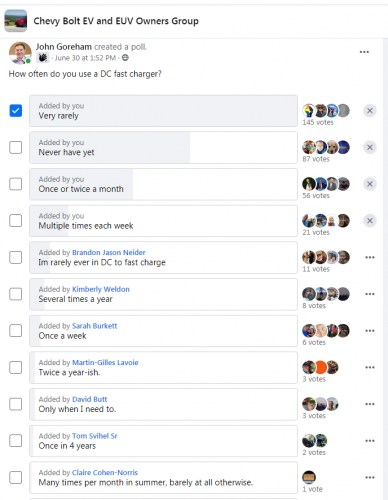
The answer is to get EV owners to the chargers and have them try out the experience. You see, when we poll owners of EVs, most report that they only charge at home, and almost none report using DC fast chargers.
When I plugged into the EVgo DC fast charger, I hadn’t thought about the cost. After all, we constantly hear how affordable EVs are to power up. I have done the math at my own home, and I know that the cost is typically about five to seven cents per mile of range I add back on my home charger using my relatively pricey Boston-area electricity. $10.15 for just 34 miles was a “shock.” Get it, shock. Bet you never heard that in an EV story before.
Related Story: New Hampshire Innkeepers Demonstrate EV-Driving Guest Best Practices
Feel free to tell us in the comments below what you typically pay to charge in public at a DC fast charger and how that cost compares to your cost at home.
John Goreham is a long-time New England Motor Press Association member and recovering engineer. John's interest in EVs goes back to 1990 when he designed the thermal control system for an EV battery as part of an academic team. After earning his mechanical engineering degree, John completed a marketing program at Northeastern University and worked with automotive component manufacturers, in the semiconductor industry, and in biotech. In addition to Torque News, John's work has appeared in print in dozens of American newspapers and he provides reviews to many vehicle shopping sites. You can follow John on TikTok @ToknCars, on Twitter, and view his credentials at Linkedin
Set as google preferred source


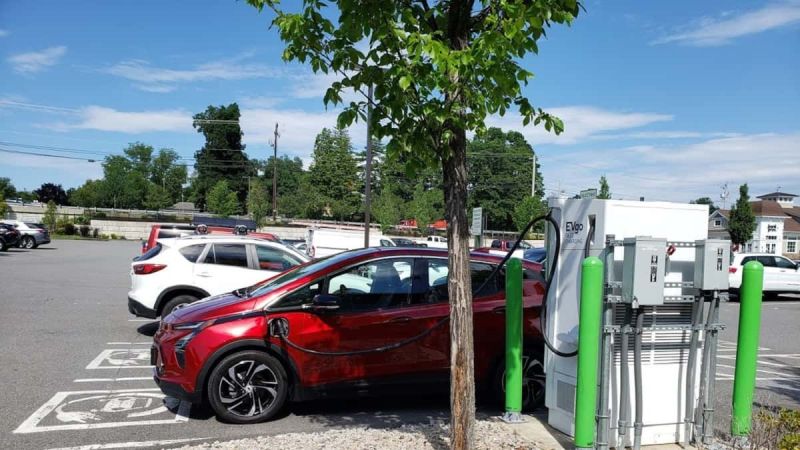




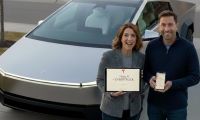
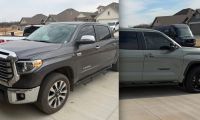
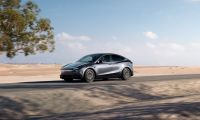
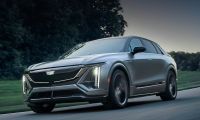

Comments
"The Dodge had 797 hp, and it
Permalink
"The Dodge had 797 hp, and it returned a combined fuel mileage of 24 MPG in our use on the same route we tested the Bolt." Impressive - I think I'll buy a Dodge...
That's why I wouldn't own a
Permalink
In reply to "The Dodge had 797 hp, and it by Mark Day (not verified)
That's why I wouldn't own a Chevy bolt
Tesla on the other hand has way more advanced technology in the EV industry
That's why they have free charging and the vehicles go way further than any other EV on the market if you're going to buy an EV by Tesla you'll go places fast and a very long ways. Between stops
You shure dont have a clue
Permalink
In reply to That's why I wouldn't own a by Stephen Rideout (not verified)
You shure dont have a clue what your talking about. Tesla's the big name, but there range when tested is exaggerated. From what i hear and read the kia and nissan have them beat. You go and pay your big bucks for a tesla, OH dont forget to dump it before the warrantee expires, well designed to drive, except the idiots forgot it might need to get serviced. You half to tare the hole car appart to service the batteries or electronics around them. Listened to a tesla not dealer, but a guy that has shops that service electric vehicles. You could be looking at major money to repair tesla vehicles,even minor repairs
The tesla battery is attached
Permalink
In reply to You shure dont have a clue by Graham Ferguson (not verified)
The tesla battery is attached to the underside. And only requires a ratchet, and jack to remove.
Models have hit 400k with no major issues. The new model 3 is hitting 180k miles with no major issues.
Right on, my model 3 has
Permalink
In reply to The tesla battery is attached by David (not verified)
Right on, my model 3 has 26000 miles of trouble free driving, only maintenance so far, tire rotation, no much to fail when compared to an ICE car it has less than 50% of parts, plus it’s faster than cars twice the price of a Tesla!
Lol, your thrnonr that has no
Permalink
In reply to You shure dont have a clue by Graham Ferguson (not verified)
Lol, your thrnonr that has no clue. Tesla in town are running 20,30% more than their epa range. Nit less. I own one. 210 w hrs per mile easy. 250 in 95 degrees heat.. thr only way u can not get rated range is if you are all over it.
Yes, this article is clueless
Permalink
In reply to Lol, your thrnonr that has no by Casey sly (not verified)
Yes, this article is clueless and very misleading. You can do way better than evgo at this bias situation. 90% of most EV owners is at home $0.10 to $0.25 per KW in CA. The average EV does 3 to 3.5 miles per KW. This results in a real $0.03 to $0.08 per mile...Nice try dishonest Torque News. I also own gas guzzlers too, I'm honest about both. EV are way cheaper than gas, but gas muscle car are more fun.
Lon, did you read the first
Permalink
In reply to Yes, this article is clueless by Lon stachowiak (not verified)
Lon, did you read the first sentence of the story? How about the paragraph (highlighted in bold print) about free EV charging? How would you report differently on having this experience?
The EvGo stations in NC are
Permalink
In reply to Yes, this article is clueless by Lon stachowiak (not verified)
The EvGo stations in NC are few and far between. I use Electrify America when making long trips as well as Chargepoint( meaning 285 or more miles in a day.)
I think The rates in all the 3 networks vary drastically by state. As a member i pay .31cnt/kWh
On The Level 3 DC At Electrify America. This would be The most expensive I ever pay for charging yet still it is cheaper than petrol..I charge at home frequently using a free Level 1 charger plugged in to my 110 outlet The latter cost me a little over .10cnts kWh in my country(home utility rates)...In other words to fully charge up I pay The equivelent of $6.50 which Gets me around 285 travel miles on. Hyundai Kona electric
Most kw price comparisons do
Permalink
In reply to Yes, this article is clueless by Lon stachowiak (not verified)
Most kw price comparisons do not include the true cost of electricity. To get true cost you must divide total bill by kw used. In MA 75% of the electric bill is not kw but charges related to delivering electricity unless in a municipal light town
Tare the hole care apart huh?
Permalink
In reply to You shure dont have a clue by Graham Ferguson (not verified)
Tare the hole care apart huh?
Sure* you're* their* warranty
Permalink
In reply to You shure dont have a clue by Graham Ferguson (not verified)
Sure* you're* their* warranty* have* tear* whole* apart*.
I can't take you seriously.
... Really! Those are the
Permalink
In reply to You shure dont have a clue by Graham Ferguson (not verified)
... Really! Those are the comments you make while calling anyone else ignorant or telling them that they don't know what they're talking about? A long range Model 3 or Y will crush anything from Chevy currently in range, power, charging or reliability. If you had done any type of actual research, even from the more biased anti-Tesla publications recently, you would know that.
The last time I charged my Model 3 Long range from less than 5% to 100%, it cost me less than $22 at a level 3 supercharger and it took just over 30 minutes. Supercharger costs, just like gas are very much dependent on local electricity costs from local providers so costs can vary from state to state. Charging at non-Tesla chargers unfortunately seems to depend on whether you have a relationship with the company who's charging network you are using.. That is currently an unfortunate thing in the US as the competing networks roll out, but I suspect that will change over time as people buy more electric vehicles, the competition heats up and these providers realize that they have to streamline thei charging networks and reign in their prices to compete. That example of the Chevy Bolt in this article is not at all common for people who regularly change in public and is even more rare for those who have home chargers who often only have to pay 12 to 13 cents per kw 9n average around the country. Only people out of network at public chargers or people in super high cost electricity zones as 8n parts of California ever pay prices as quoted in the article above.
Agree that Kia and other EVs
Permalink
In reply to You shure dont have a clue by Graham Ferguson (not verified)
Agree that Kia and other EVs match tesla's range for about a third the price. That said, please invest in a 5th grade remedial spelling course if you're going to post on a public forum.
Whether you prefer gas or
Permalink
In reply to Agree that Kia and other EVs by Russ (not verified)
Whether you prefer gas or electric, Nobody escapes the spelling police!! If you can figure out what the correct spelling should have been, then his communication was effective. Perhaps you should concern yourself with the content of the messages and not how many typos you can spot. It's these kinds of comments that are irrelevant and shouldn't be posted, nobody cares if your an excellent speller, it's not a job interview!
I like to see if you could
Permalink
In reply to You shure dont have a clue by Graham Ferguson (not verified)
I like to see if you could build a car company that was as successful as Tesla, so I can (complaint) at all your (stuff). Edited by TN for language. Thanks for your comment.
What a foolish comment. Lets
Permalink
In reply to I like to see if you could by Mgbone1 (not verified)
What a foolish comment. Lets try Ford Motor company. Even in its early years, they sold over 15 million Model T's. and until just recently Tesla hasn't even broken a profit as a company. They almost went under several times. I know several people who have many complaints about their Teslas and will not get rid of their gasoline powered vehicles. Pathetically Poor fit and finish on several areas of each individual vehicle, range 20%+ Less than advertised, months to get issues fixed on the car (these are factory new cars) lack of local repair centers. Their mobil repair is not good. Completely unacceptable issues to complete with other car companies, much less claim they are any kind of leader.
Playing the long game shows
Permalink
In reply to What a foolish comment. Lets by Emmanuel (not verified)
Playing the long game shows it's benefits. Our global predicament with Russia invasion of Ukraine illustrates why ICE vehicles leave us vulnerable to Petrol States manipulation. I'm paying $0.025/ mile when charging from home at night, automatically and my utility likes it because they have excess generation capacity then. A total win/win. What would happen if gas stations charged 50% less at 2am?
EV owners have to change their thinking about fueling their vehicle also, you only charge at a public charger enough to get you to your destination not fill up as you would to amortize the overhead of visiting a gas station.
Sure not Shure
Permalink
In reply to You shure dont have a clue by Graham Ferguson (not verified)
Sure not Shure
Their not There
Warranty not Warrantee
Have not half
Tear not Tare
Whole not Hole
Apart not Appart
All those in the same comment, before using words like "idiots" to describe people that you're commenting on, I'd make sure you don't sound like one yourself (or should I have said shure?)
I charge my model P3D+ Tesla
Permalink
In reply to You shure dont have a clue by Graham Ferguson (not verified)
I charge my model P3D+ Tesla and crush Dodge demons but when I feel like it I go 300 miles on $15 in energy. Read it and weep.
My buddy just parted out his
Permalink
In reply to I charge my model P3D+ Tesla by systemBuilder (not verified)
My buddy just parted out his Tesla because they wanted $24,000 for a new battery that's out of warranty. He took that $24,000 and both an awesome low mileage ice car then starting stripping the Tesla. Meanwhile my Chevy went 580,000 miles without any issues and it still runs. If I know how to do math you calculate the battery replacement costs you are financially better to own an ice getting 15 mpg. That's using calculations without including the higher prices of EV, higher registration, and the electric power costs of the EV. Add that in and you'll save money driving an 18 wheeler as a personal vehicle.
Doubt it, my Durango hellcat
Permalink
In reply to I charge my model P3D+ Tesla by systemBuilder (not verified)
Doubt it, my Durango hellcat is faster than my 21 performance 3 and a demon is faster. You likely have never seen a demon during on a public road, anyone that has one isn’t piling miles on.
might try an English and
Permalink
In reply to You shure dont have a clue by Graham Ferguson (not verified)
might try an English and writing class.
might try an English and
Permalink
In reply to You shure dont have a clue by Graham Ferguson (not verified)
might try an English and writing class.
Sure*, their*, warranty*,
Permalink
In reply to You shure dont have a clue by Graham Ferguson (not verified)
Sure*, their*, warranty*, have*, tear*, whole*, apart*.
Bro...
My friend that leased a Tesla
Permalink
In reply to You shure dont have a clue by Graham Ferguson (not verified)
My friend that leased a Tesla “S” said he needed to go to the dealership twice, once to pick up the car and the next time to return it at the end of the lease. No services were needed!
From what you hear and read?
Permalink
In reply to You shure dont have a clue by Graham Ferguson (not verified)
From what you hear and read? So you don’t know, you don’t own a Tesla do you? I don’t think your opinion is valid then. I have had a model 3 performance for over a year and not once have had an issue charging with Teslas super chargers. All EVs lose a ton of range when you drive them like you stole them. So does my Durango hellcat, mileage drops to 8 mpg the way I drive it while wife gets 14+mpg.
If you get a Tesla, you
Permalink
In reply to That's why I wouldn't own a by Stephen Rideout (not verified)
If you get a Tesla, you better have a spare vehicle and very, very deep pockets. Repair costs for Teslas are sky high, and things break or fail on Teslas all the time. Out of the top 34 major brands world wide, Tesla ranks 4th least reliable auto maker, and 1st for most defects in a new car. If you manage to find an independent repair shop to fix your Tesla, you run the risk of having exclusive features, like supercharging or autopilot, permanently disabled by the manufacturer. Ask James Klafehn about his Tesla service experience.
Not true. The free
Permalink
In reply to That's why I wouldn't own a by Stephen Rideout (not verified)
Not true. The free electricity at Tesla is a marketing strategy. They do it to sell their cars. It is also at a few stations and charge time is limited. And don't think it is permanent free. Then everybody would be driving EVs. Nothing is for free.
By the way, the Mustang Mach E has a much better range and similar charge times than the comparable Tesla model. And build quality is light-years ahead of Tesla. The Mach E is outselling the similar Tesla model by a large margin.
Funny the four mach e owners
Permalink
In reply to Not true. The free by Theo Van Niekerk (not verified)
Funny the four mach e owners all got ride of it. And turn it in. Guess you missed the note about mach e needing jump starts cause of 12v battery issies
Pagination